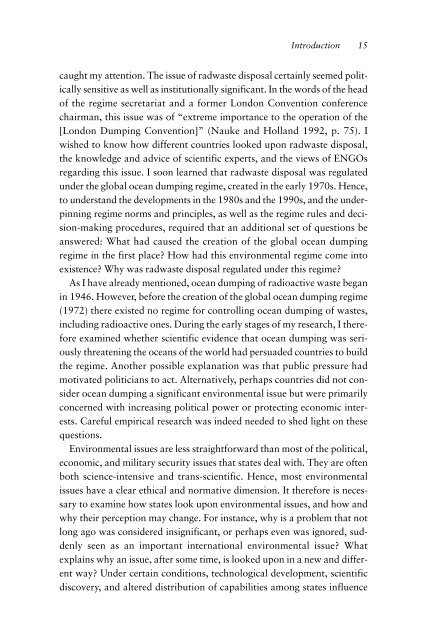Radioactive Waste Disposal at Sea: Public Ideas ... - IMO
Radioactive Waste Disposal at Sea: Public Ideas ... - IMO
Radioactive Waste Disposal at Sea: Public Ideas ... - IMO
You also want an ePaper? Increase the reach of your titles
YUMPU automatically turns print PDFs into web optimized ePapers that Google loves.
Introduction 15<br />
caught my <strong>at</strong>tention. The issue of radwaste disposal certainly seemed politically<br />
sensitive as well as institutionally significant. In the words of the head<br />
of the regime secretari<strong>at</strong> and a former London Convention conference<br />
chairman, this issue was of “extreme importance to the oper<strong>at</strong>ion of the<br />
[London Dumping Convention]” (Nauke and Holland 1992, p. 75). I<br />
wished to know how different countries looked upon radwaste disposal,<br />
the knowledge and advice of scientific experts, and the views of ENGOs<br />
regarding this issue. I soon learned th<strong>at</strong> radwaste disposal was regul<strong>at</strong>ed<br />
under the global ocean dumping regime, cre<strong>at</strong>ed in the early 1970s. Hence,<br />
to understand the developments in the 1980s and the 1990s, and the underpinning<br />
regime norms and principles, as well as the regime rules and decision-making<br />
procedures, required th<strong>at</strong> an additional set of questions be<br />
answered: Wh<strong>at</strong> had caused the cre<strong>at</strong>ion of the global ocean dumping<br />
regime in the first place? How had this environmental regime come into<br />
existence? Why was radwaste disposal regul<strong>at</strong>ed under this regime?<br />
As I have already mentioned, ocean dumping of radioactive waste began<br />
in 1946. However, before the cre<strong>at</strong>ion of the global ocean dumping regime<br />
(1972) there existed no regime for controlling ocean dumping of wastes,<br />
including radioactive ones. During the early stages of my research, I therefore<br />
examined whether scientific evidence th<strong>at</strong> ocean dumping was seriously<br />
thre<strong>at</strong>ening the oceans of the world had persuaded countries to build<br />
the regime. Another possible explan<strong>at</strong>ion was th<strong>at</strong> public pressure had<br />
motiv<strong>at</strong>ed politicians to act. Altern<strong>at</strong>ively, perhaps countries did not consider<br />
ocean dumping a significant environmental issue but were primarily<br />
concerned with increasing political power or protecting economic interests.<br />
Careful empirical research was indeed needed to shed light on these<br />
questions.<br />
Environmental issues are less straightforward than most of the political,<br />
economic, and military security issues th<strong>at</strong> st<strong>at</strong>es deal with. They are often<br />
both science-intensive and trans-scientific. Hence, most environmental<br />
issues have a clear ethical and norm<strong>at</strong>ive dimension. It therefore is necessary<br />
to examine how st<strong>at</strong>es look upon environmental issues, and how and<br />
why their perception may change. For instance, why is a problem th<strong>at</strong> not<br />
long ago was considered insignificant, or perhaps even was ignored, suddenly<br />
seen as an important intern<strong>at</strong>ional environmental issue? Wh<strong>at</strong><br />
explains why an issue, after some time, is looked upon in a new and different<br />
way? Under certain conditions, technological development, scientific<br />
discovery, and altered distribution of capabilities among st<strong>at</strong>es influence

















